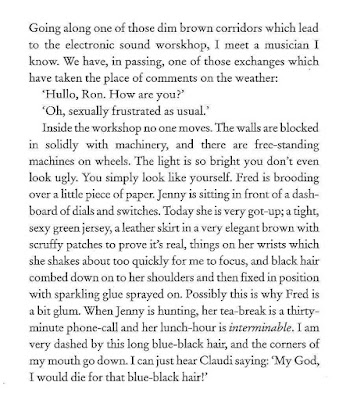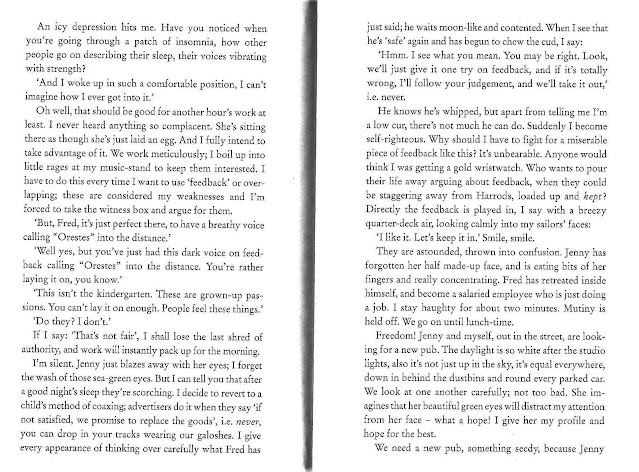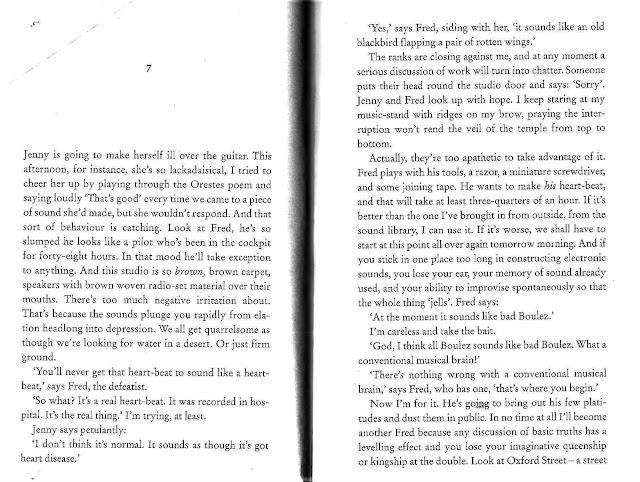Like other BBC Radiophonic Workshop fiends, I first came across the name Rosemary Tonks in connection with "Sono-Montage": a 1965 collaboration between the experimental poet and Delia Derbyshire + other Workshoppers. The program tantalizes in large part because it's not easy to hear - you'd have to visit the British Library to order it up. Some say it can be found on the internet, if you really dig around - but I've had no luck.
"Sono-Montage" is discussed, but not played, in this Lunar Poetry podcast, also available in transcript form here. Host David Turner says, paraphrasing Tonks's introduction to the program: :
"Sono-Montage is an experiment to combine poetry with electronic sound. Its aim is to put a dramatic edge on poetry read aloud and that edge is sound. What you hear in the recordings are sound collages or sound illuminations."
Sound illuminations!
Here at the unofficial BBC archive Genome is what the Radio Times said about "Sono-Montage" the week of its eventual broadcast on June 21st 1966:
A experiment in combining spoken poetry with electronically produced sounds
Arranged, directed, and introduced by Rosemary Tonks in conjunction with the BBC Radiophonic Workshop.
The programme is based on the following nine poems:
Speechhouse and Steeple-jock by Michael Baldwin
Mediterranean and A Silent Man by Peter Redgrove
Midsummer Thames and Fisherman of Alaedras by Paul Roche
Poet as Gambler, Badly-chosen Lover and Orpheus in Soho by Rosemary Tonks
Produced by George MacBeth
The original effects on which the orchestrations in this programme were based were recorded by 'Stagesound' for a public performance of sono-montage in Hampstead followed by an interlude at 18.50.
Tantalising, eh?
There is some confusion in the archives, with "Sono-Montage" seemingly appearing later on in combination with a similar radiophonics-meets-poetry work by Bob Cobbing, under the name "Permutated Poems".
Along with the experimental poetry, Tonks had a sideline in writing novels. She saw them as her more commercial front of operation and they were reviewed at the time as comic fiction, satires of Sixties London. In recent years, a coterie of Tonks-converts have been agitating for these long out of print, incredibly hard-to-find-secondhand / prohibitively-expensive-if-you-do novels as lost classics of the decade. You can hear two of these enthusiasts - Jennifer Hodgson and Stewart Lee - enthusing on this podcast Backlisted. Where at approximately 56 minutes in you can in fact hear a small snippet of Radiophonic Tonks.
The campaign seems to have led, directly or indirectly, to the reissue of The Bloater - originally published by The Bodley Head in 1968 - earlier this year as a Vintage Classic. Hodgson's review for New Left Review got me intrigued enough to pick up the mauve paperback while in London last month. I read most of it while holed up in our Islington AirB'n'B while recovering from a nasty bout of food poisoning, while the beautiful weather streamed through the huge windows. That seemed appropriate as The Bloater is a London novel that takes place in the summer. My gastric distress fit the unsettled feeling of the prose, with its heightened sensitivity to all things bodily and gastronomic. The title of the book comes from a cured herring with a pungent odour - but is also the main character's nickname for one of her would-be paramours, whose strong aroma lingers after his visits.
Part of the interest of The Bloater for the Radiophonic fiend is that there's a character based on Delia Derbyshire in it. Jenny is a colleague and a confidante to the protagonist, a musician / radio producer called Min. A couple of scenes take place in "The Electronic Sound Workshop".
Those nine and a half pages are not really reason enough to buy the book, though. What is?
Well, at first, I really wasn't sure. It took me a while to get on with Tonks's style, to get the hang of it. The writing initially feels frightfully mannered. "Brittle" is a word that reviewers often use. "Arch" also fits. The prose feels like - or even smells like - an emanation of the personality of Min, who's magnetic but not exactly likeable. Every interaction with an Other has a kind of pettish, catty quality, a flip flirtatiousness that feels (with her various male love interests) mildly sadistic. The writing also has a elliptical quality that reminds me a little of Wyndham Lewis's disjointed modernism but suffused with the personality of Oscar Wilde or a Wilde character (same difference). It can often feel like bits of information that would make a smoother read have been rubbed out with a capricious eraser. I kept trying to think who and what it reminded me of and suddenly it hit me: Morrissey and Autobiography. That quippy tone, wilful indirection, and contorted syntax. There's the same (very Wildean) inversion of seriousness: tiny defects in others, trivial inconveniences or setbacks, are monstrously inflated and absurdly bemoaned; the actual tragic is danced past blithely. Min is not unlike the demanding, impossible, amuse-me-NOW heroine in that early Smiths B-side "Wonderful Woman."
The book's demented gaiety eventually becomes compelling, though. You also begin to sense that the determined superficiality might be papering over damage deep below the surface. Apart from the BBC scenes, the milieu is posh - fancy restaurants, nights at the opera. But even though it doesn't overtly reference much that is specific to the decade, the mood is "British Sixties" in a way that vaguely reminds me of films like Accident, The Servant, and Blow-Up. The old standards and inhibitions are eroding, but archetypally English qualities of detachment and clipped coldness carry through into the new less-repressed era.
Tonks's life story is fascinating - and oddly parallels Derbyshire's. There's the burst of creativity (six novels between 1963 and 1972), the trendiness and immersion in the adventure of the Sixties... then retreat, the drying up of productivity, and disappearance. In Tonks's case, her withdrawal was into extreme conservatism. She became a fundamentalist Christian, renouncing all things worldly, and a recluse. She is believed to have gone round the country taking her books out of libraries and destroying them. She went by the name Rosemary Lightband - but amazingly this wasn't some born-again invention, just a reversion to using the name of her former husband.
More on Rosemary Tonks and the Radiophonic Workshop in this blogpost at Superintendent Idle Tiger
And more about her poetry, novels and life in this long piece at The Paris Review by Lucy Scholes.
And more still from Thea Smith, who comments:
"Sono-Montage, a critical intervention into sound and poetry was not unrecognised at the time, but apart from a single repeat on the BBC hasn’t been heard in public in nearly 50 years. A few segments – Rosemary’s own poems – were played at a recent event at Flat Time House, Peckham, due to the curator, Lucy Reynolds, being Rosemary’s great niece. She has also been able to give me some insight into Rosemary’s character and background, and her complex relationship with feminism. She was fun, but John Horder recalled, she ‘spoke with an intensity bordering on active aggression’. This opinion of her may have been mistaken for assertiveness; Tonks achieved so much in her short career that others could not.
"I managed to listen to Sono-Montage several times at the British Library, as well as being able to access her novels, after their forty-eight hour transit from the deepest darkest vaults of literature. I decided it was worth excavating; it is an interesting, and important, critical intervention in radio, coming quite early in terms of broadcast experiments into poetry and sound, alongside more famous broadcasts by Bob Cobbing & Barry Bermange. Accessing information about Sono-Montage was difficult, even Neil Astley hadn’t heard it, so to excavate it now, one year after her death, seems like a fitting tribute to her not inconsiderable efforts to make this thirty-minute recording. There are many links between the programme, her writing (both poetry and prose), and criticism, but also many contradictions: in style and attitude, if not tone. An unusual artefact, Sono-Montage is the invisible peak of Tonks’s personal epoch."
.jpg)







.jpg)













